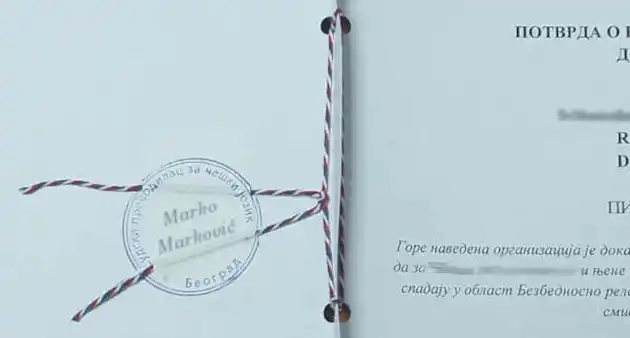Halifax Certified Translation
Halifax provides certified translation services for a wide range of languages. They are carried out by a court interpreter selected for the right language combination and availability to suit the client’s schedule.
For official interpreting services, we provide a sworn-at-court interpreter at the time and location you need.
Court translation services are regulated by law, and are specific to each country (see more below). We provide court translation services certified for the Republic of Serbia, where we are headquartered.
When is a stamped translation or court interpreter required?
Official translation services of this kind are usually required for documents in any language that are used for an official procedure in the Republic of Serbia, or when using a Serbian document in an official context abroad. In Serbia, official court documents, diplomas, certificates and supporting documents for applications for any government service must often be submitted together with an official translation.
For oral procedures with legal consequences such as weddings, or for certain notarization procedures, a court interpreter may be required.

Who may provide a certified translation?
Certified services in Serbia can be provided by a certified translator. This is a translation professional often called a court translator, court interpreter or a sworn-at-court translator.
A sworn translator is accredited by the Ministry of Justice or the Autonomous Province of Vojvodina. He or she has an official stamp that is applied to the pages of a translation. The translator certifies that the translation is true to the original.
What does the certification look like?
An officially translated document is provided in two copies. Each is complemented with a declaration signed by the court translator. The translation is printed and bound to the original document or a copy of the original, with the translation uppermost. The binding is sealed with the court translator’s unique stamp.
Two bound copies are usually provided. If required, additional copies can be provided for a further fee.

What does it cost?
A sworn translator usually charges per physical stamped page, since one of the most important things about a certified translation is the official approval. Longer documents can be charged according to the number of words or characters, like other translations: we must judge what is a fair price for the translator’s time.
A certified translation is provided in two copies. If required, more can be made at an additional charge.
An official interpreter is charged by the hour at your location, depending on the language of the assignment.
Be careful if you are comparing prices, not all companies make the unit of measurement clear.
Our professional certified services are the most cost-effective you will find (read about translation rates here).
Can I book a court interpreter to come anywhere I wish?
Yes. A court interpreter will come to wherever you need them, such as a court, a wedding, your office or a conference venue. Halifax’ certified interpreters cover the whole Balkan region. They can also travel with you if required.

Can official translations be provided between languages other than Serbian?
In Serbia, each official translator is approved for a language combination that includes Serbian. A certified English translator, for example, may certify a translation from English to Serbian or from Serbian to English. If an official translation between two languages other than Serbian is needed, then an authorized translator may provide a translation from the original language into Serbian, followed by another who translates from Serbian into the target language. Both translations are signed, sealed and bound together. Some court translators are approved for several languages, which can be useful for multilingual tasks.
Is this system the same in all countries?
No. Just about every country has a different system, and some have none. If you need to use a translation for official purposes it’s worth checking just what is required and where. Just see the difference between the Serbian system and the US one, for example in this article by the American Translators Association.
How is certified translation different from a notarized document?
A public notary in Serbia has no authority to certify the accuracy of a translation. The notary may certify that a document is a true copy of an original, or that a signature is valid and provided by the person who signs. For documents in a language other than Serbian to be notarized however, an official translation is often required.
Are there any possible difficulties I should be aware of?
Perhaps. Under Serbian law, any court translator may certify an official document. In practice, however, some courts demand that you use a translator registered in their geographical area. To be sure, ask us and we will find the right translator.